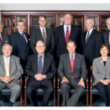Top Secret America: The Rise of the New American Security State
(Libby/OverDrive eBook, Kindle)
Available Platforms
Description
More Details
Excerpt
Similar Titles From NoveList
Similar Authors From NoveList
Published Reviews
Choice Review
Priest and Arkin (both, Washington Post) have not set out to produce an academic examination of their subject based on scholarly research. Rather, they contribute a highly polemical yet engaging expose of US security policy since 9/11. Unfortunately, their book arrives about five years too late to contribute anything novel to the discussion of counterterrorism efforts. Readers may be shocked to learn, for example, that the US government spends enormous amounts of money on national security. Or that the number of government agencies involved in top-secret programs has grown exponentially. Nevertheless, though the book may traverse well-covered ground, it certainly tells the story with an energetic journalistic flair. Many chapters begin with clever, personal vignettes to add human interest to the story. Other chapters bear gripping, if somewhat vague, titles such as "Supersize.gov" and "007s." Research librarians and scholars will find little to assist their work in this book, but general readers looking for a critical account of US national security policy with a sensational edge will enjoy the experience. Summing Up: Recommended. General readers. R. D. Stacey Houston Baptist University
Publisher's Weekly Review
Priest and Arkin, columnists for the Washington Post and other media outlets, won the 2010 George Polk Award for their expose of the surveillance state. Here, they blow the whistle on how, since 9/11 and the adoption of the Patriot Act, the government and its contractors use classification and security screens to conceal expenditures that have failed to enhance national security. Volumes of information defy efforts to be processed or analyzed as layers of bureaucratic intermediaries dilute command and control. For instance, Northcom (Norad's re-placement) has no command over other agencies while former Defense Secretary Gates refused to lead the new National Intelligence Directorate because the position had no real power. Furthermore, the authors contrast the disorganization of stateside security with methods employed by General Stanley McChrystal in Iraq and Afghanistan-where, for example, social networks generated cell phone user data to provide target lists for Exord special teams. Overall, this is an important book that should receive greater attention. Agency: Ross Youn (Sept.) © Copyright PWxyz, LLC. All rights reserved.
Library Journal Review
Two veteran investigative reporters examine the scope of national security's and government agencies' response post-9/11. (c) Copyright 2011. Library Journals LLC, a wholly owned subsidiary of Media Source, Inc. No redistribution permitted.
Kirkus Book Review
Washington Post reporters Priest (The Mission: Waging War and Keeping Peace with America's Military, 2003) and Arkin (Divining Victory: Airpower in the 2006 Israel-Hezbollah War, 2007, etc.) published the beginnings of this book as a newspaper series during 2010. The authors are meticulous but angry reporters, openly dismissive of the national-security apparatus begun by the federal and state governments at least 100 years ago, then expanded significantly after 9/11. Although President Obama vowed to curtail the national-security state and overall government secrecy in the wake of the Bush administration, Priest and Arkin demonstrate that the current president has abandoned that vow. They calculate that at least 850,000 individuals inside government and within government contractors have received "top secret" security clearances. Untold hundreds of thousands more individuals are cleared to use and abuse secret but not top-secret information. Priest and Arkin reach the sad but unavoidable conclusion that 9/11, combined with other real and threatened incursions by terrorists, has led to an around-the-clock police state. In addition to compelling anecdotes, the authors cite as examples the regular broadcasts of threat warning levels from the Department of Homeland Security, a culture of fear surrounding discussions of al-Qaeda by politicians and the public and budget-busting measures to protect what is unprotectable or perhaps not even in danger. A mixture of investigative reporting and advocacy journalism that shines light in dark corners but is ultimately depressing because the authors seem convinced that the paranoia and its dangerous offshoots will never dissipate.]] Copyright Kirkus Reviews, used with permission.
Library Journal Reviews
"The government has built a national security and intelligence system so big, so complex and so hard to manage, no one really knows if it's fulfilling its most important purpose: keeping its citizens safe." As stated on the website of the Washington Post, that's the thrust of this book, derived from a series that the Post published. Two years in the making, the series was written by multiple Pulitzer Prize winner Priest and Arkin, who has reported on national security for more than three decades. Appearing in July 2010, the series has so far received 11 million hits. Essential.
[Page 72]. (c) Copyright 2010. Library Journals LLC, a wholly owned subsidiary of Media Source, Inc. No redistribution permitted.Library Journal Reviews
A history of the growing national security state and a chronicle of the lack of accountability for national security agencies toward the citizens of the United States. Priest looks at the myriad ways increased security (of which technological surveillance is one piece) fails to live up to its own rhetoric. (LJ 4/15/11)
[Page 43]. (c) Copyright 2015 Library Journals LLC, a wholly owned subsidiary of Media Source, Inc. No redistribution permitted.PW Annex Reviews
Priest and Arkin, columnists for the Washington Post and other media outlets, won the 2010 George Polk Award for their exposé of the surveillance state. Here, they blow the whistle on how, since 9/11 and the adoption of the Patriot Act, the government and its contractors use classification and security screens to conceal expenditures that have failed to enhance national security. Volumes of information defy efforts to be processed or analyzed as layers of bureaucratic intermediaries dilute command and control. For instance, Northcom (Norad's re-placement) has no command over other agencies while former Defense Secretary Gates refused to lead the new National Intelligence Directorate because the position had no real power. Furthermore, the authors contrast the disorganization of stateside security with methods employed by General Stanley McChrystal in Iraq and Afghanistan—where, for example, social networks generated cell phone user data to provide target lists for Exord special teams. Overall, this is an important book that should receive greater attention. (Sept.) Agency: Ross Youn
[Page ]. Copyright 2011 PWxyz LLCReviews from GoodReads
Citations
Priest, D., & Arkin, W. M. (2011). Top Secret America: The Rise of the New American Security State . Little, Brown and Company.
Chicago / Turabian - Author Date Citation, 17th Edition (style guide)Priest, Dana and William M. Arkin. 2011. Top Secret America: The Rise of the New American Security State. Little, Brown and Company.
Chicago / Turabian - Humanities (Notes and Bibliography) Citation, 17th Edition (style guide)Priest, Dana and William M. Arkin. Top Secret America: The Rise of the New American Security State Little, Brown and Company, 2011.
Harvard Citation (style guide)Priest, D. and Arkin, W. M. (2011). Top secret america: the rise of the new american security state. Little, Brown and Company.
MLA Citation, 9th Edition (style guide)Priest, Dana, and William M Arkin. Top Secret America: The Rise of the New American Security State Little, Brown and Company, 2011.
Copy Details
| Collection | Owned | Available | Number of Holds |
|---|---|---|---|
| Libby | 1 | 0 | 0 |


































